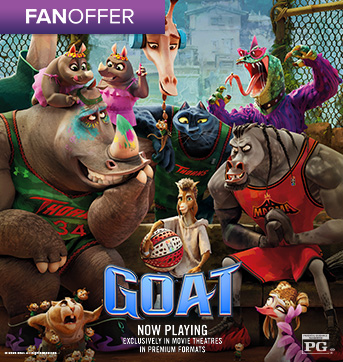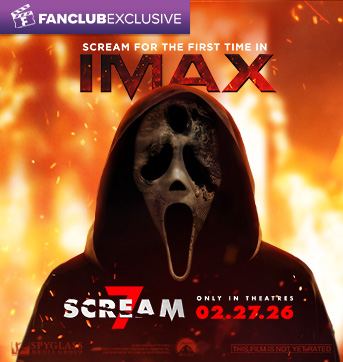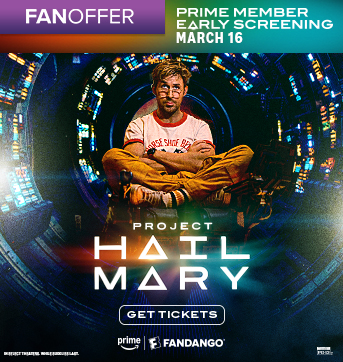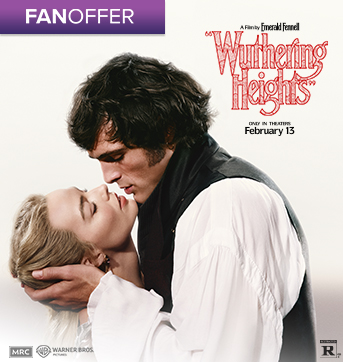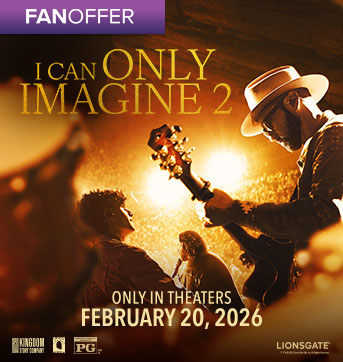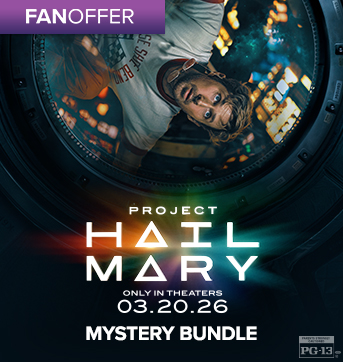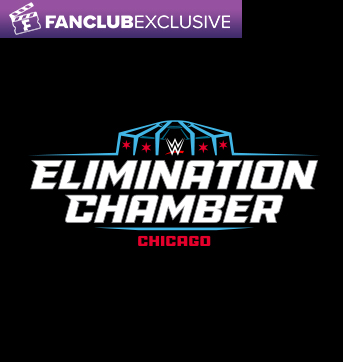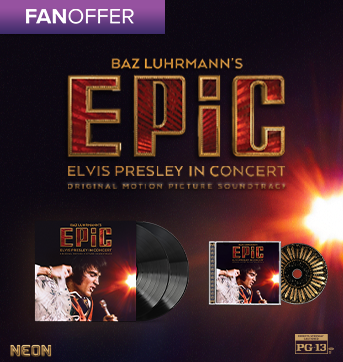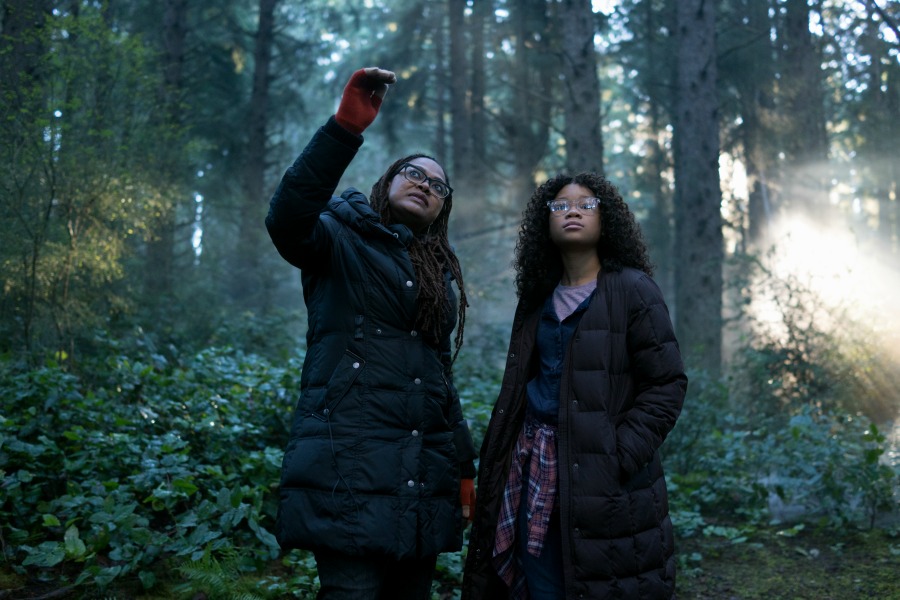
On March 9, audiences will accompany a young girl named Meg on a miraculous journey across time and space when Disney’s A Wrinkle in Time finally hits the big screen. When Meg goes in search of her father, she learns of a dark force seeking to control our world -- and she, her little brother, her friend and three mysteriously magical women, may be the only ones who can stop it.
Ava DuVernay, the first African-American woman to ever helm a film with a budget over $100 million, directs, and she has assembled a stellar cast which includes Oprah Winfrey, Mindy Kaling and Reese Witherspoon as the mysterious Mrs. Ws. The film also stars Chris Pine, Zach Galifianakis and newcomer Storm Reid as Meg Murry.
To celebrate advance tickets going on sale today here at Fandango, we partnered with DaVette See from the site Black Girl Nerds on an exclusive conversation with DuVernay, who adapted Madeline L’Engle’s classic young adult science-fiction book of the same name.
DuVernay shared with us some of her challenges and triumphs during the making of the film, including her excitement over the just-announced soundtrack album featuring Sade's first new song in eight years.
DaVette See for Fandango: I'm going to have to start out with your tweets this week announcing the A Wrinkle in Time soundtrack, featuring Sade, Demi Lovato, Sia, Chloe + Hallie, and Kehlani. I mean, you must be over the moon right now.
Ava DuVernay: Yeah. I really love the response from people. We worked so hard on the soundtrack. I had a specific idea about what I wanted sonically, but also just the kind of artists that were around it. I just wanted to have a certain energy, and all of these women really are similar to the women in the movie—the three Mrs. Ws, these powerful entities that kind of come and help you along the journey. Sade, Sia, Kelanni, Demi, Chloe and Hallie [have] an energy of a presence.
Women are present, and that very presence is valuable. That we should not be absent from any space, that we are on par with whatever else is going on - these women all made songs that really speak to that and with the heroine's journey in Wrinkle.
Fandango: So, you can tell me: what did you have to do to get Sade to come out of semi-retirement?
DuVernay: You know, you're the first person I'm speaking to about it. You're the first interview I've done. I didn't do anything but call her. We reached out to management. I sent a passionate letter, and she literally called me the next day. It was a good letter.
I'm a lifelong fan and devotee to her music and her artistry, and she really connected with the story of Meg and my ideas, and she came right on board and was a great partner.
Fandango: While we're on the subject of music. I had a chance to actually visit the scoring stage on one of the last days that Ramin Djawadi was recording some remaining cues. I'm just going to tell you, I was moved to tears.
DuVernay: Oh, good! I'm so glad. He is spectacular, and his work in this is so deeply rooted and warm and wise and wondrous. I mean, I love him from Game of Thrones. I just love that music, but to be able to get inside the heart and mind of a kid who’s trying to figure out the big questions in life that we all have to grapple with, and make it so cinematic and gorgeous. Believe me, I've cried too, listening to his stuff, so you're not alone.
Fandango: How much did you have to talk with him about the music, or did he just, like, blow you away from jump?
DuVernay: No, he just blew me away from jump. I mean, he can do anything, he really can. So, when we sat down, first of all, our personal connection was so lovely. He's just a really, really good-hearted person.
Our conversations about what we wanted to do sonically included music, score, source cues, his compositions, sound with Skywalker [Sound]. He was a real partner in figuring out the overall sonic landscape beyond even his own compositions—that's how much he embraced that part of the filmmaking process. But, just emotionally, he tapped right into the story. He does really exquisite work.
Fandango: There are a couple of generations of women and girls who've been waiting for a Wrinkle in Time movie - how do you go about adapting it to appeal to them, as well as people who haven't read the book?
DuVernay: I equate it to what I did with Selma when I rewrote Dr. King's speeches. I didn't want to write Dr. King's speeches. We weren't able to get the rights to his real words. So, I had to really read his words, think about what he intended to say, and say it in a different way.
It's the same process with Miss L'Engle. I had to read the words, keep myself in the story, and, along with Jennifer Lee, the screenwriter, really think about: what did she want to say? In speaking with her niece, and her granddaughter, and other people who knew her, she was an artist. She wrote this book in 1963. She was a radical, ahead of her time, and she had some key things that she wanted to say, and I knew that I could try to hit those things, but didn't have to say them in the exact same way.
So, it's about how you can stick what she really wanted to say about [goodness] and doing good in our society, and the choices that you have to make for your life as a young person deciding who you want to be in this life. Folks are going to come to the movie and expect an exact retracing of the 1963 book. That's not what they're going to get, but if they want to feel the same way they felt when they finished reading the book, that was my goal.
Fandango: Let’s talk about Meg. Tell me about the moment you decided to cast Storm, and what was the thing about her that made you think, "Yeah, that's my Meg"?
DuVernay: Well, she's an incredible actress, and when I say incredible I mean it in the truest sense of the word and not as hyperbole. She blew me away with her deep commitment to the character, commitment to her craft. The definition of incredible is “impossible to believe,” and she was. As she stood before me in the audition room I thought, "How did I get this lucky, for this girl to walk in here and be able to do this?"
Meg is in every frame of the movie. There's nothing in the film that's not on Meg's shoulders. You needed a 12 to 14-year-old who could pull off going from a place of extreme darkness in her life to buoyant triumphant moments to literally battling evil and all the nuance it takes to navigate that. I knew it was going to be a tall order, and then Storm Reid came in and it all became so easy because she is so good. She was the one from the minute she came through the door.
Fandango: For those who may be thinking, "Well, it's just a story for a little girl. I don't think my son needs to go see this." What would you say to that person?
DuVernay: It's a film for kids and families. It's an emotional experience for kids and families. There are three main characters in the film and in the book, and two of them are boys. So, I think I would tell anyone who feels slighted by the fact that the main character is a girl to look at 95% of the films that girls have been asked to go to and [asked] to feel a part of.
Fandango: What was the most challenging aspect about bringing this beloved novel to life on the big screen?
DuVernay: Yes, it's a challenging book to bring to life. Madeline L’Engle's writing is very sensory. It is about perception and things that are just the beyond the words. It's more about a mood, a vibe. This is a book that does not have a villain with teeth and a name. There is no Darth Vader, there's no Killmonger, there's no bad guy. The darkness is the bad guy. The ”it” is a manifestation of the darkness that you carry inside of yourself. So, to be charged with putting that into a cinematic language that people can enjoy and be entertained by was a tall order.
There were plenty of times where we had to really wrestle with the text and the ideas and try to figure out how to get to what Madeline L’Engle intended, and to do it in a way that was entertaining and appealing to audiences in 2018. We spent a lot of time doing it. We think we've done it.
Fandango: You’ve tweeted about you and [Black Panther director] Ryan Coogler working across the hall from each other while editing your films. Can you recall like, one moment, one fun day, one special conversation or joke that you shared that buoyed you both when you really needed it most?
DuVernay: We were together quite a bit, so it's hard to come up with an anecdote. But we would often take walks around the lot, the Disney lot there in Burbank, and he would either come get me and say, "Let's take a walk." Or, I'd come get him. We just walked around, talking about whatever we were working on that day, or sometimes other things. We work in a human rights organization together, and we talk about the world. Sometimes, not talking about the work at hand, informs the work at hand. It was great to have that camaraderie, as we were both taking on projects of a certain size and a certain weight. Both based on books, both based on something that fans very much love.
So, yeah, he was a great friend to me then and now. So, so, so, so overwhelmingly thrilled [for him].
Fandango: Seeing Ryan helm an action-hero kind of adventure, are you tempted at all to do something like that? Like, maybe, I don't know, Star Wars?
DuVernay: [laughing] I had a great time making Wrinkle. There are so many stories that I want to tell, and what Wrinkle did was gave me access to a full tool box that often has been kept out of the reach of women filmmakers. To be able to have the tool box that the boys get to play with has been beautiful and a little addictive, so you'll probably see me back doing something, but what, I don't know.
Fandango: A lot of women are grateful to you for breaking that particular glass ceiling. Have you had little girls coming up to you saying, "I want to direct. I want to be like you. You're my new hero."?
DuVernay: I hear from kids about Wrinkle, and I hear from people that aren't necessarily kids about my journey, [which] is not just one of gender and of race, it's also of age. I didn't pick up a camera until I was 32, and I'm 45 now on my third film. And you look at Ryan [Coogler], and he's 31 on his third film, so I'm much older than most folks getting started in it. But it's about not letting age, race, gender, any of the things that people say should stop you. It doesn't stop me - it fuels me.
Fandango: Last question: are Chris Pine's eyes really that blue, and did you ever catch yourself just staring into them when you were trying to direct a scene?
DuVernay: Yes. They are bluer than you think, and they are quite dreamy. He's a super, really, really, lovely man. He's become a friend. So smart and such a good actor. Underrated. I found him to be super soulful in his performance in Wrinkle.
But, yeah, plenty of times I was like, "Look, don't look at me like that. Look over there. Don't look at me with those eyes."
A Wrinkle in Time arrives at theaters March 9. You can get your advance tickets right here on Fandango.
DaVette See lives in Inglewood, CA and can’t name a single sports team. She is a filmmaker, writer, wife, daughter and mom to seven (yes, seven) cats. When not covered in fur, she’s a regular contributor to Black Girl Nerds because she is one, and she is the producer/star of the upcoming web-based talk show, Afro Bites! Follow her on Twitter and IG @mariavah

